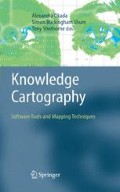Abstract
This chapter describes how a mind mapping tool, Compendium, is being used to help designers and teachers create and share learning activities. Initial evaluation of the use of the tool for learning design has been positive; users report that it is easy to use and helps them organize and articulate their learning designs. Importantly the tool also enables them to share and discuss their design strategies. The chapter will ground this work within the wider literature on learning design, focusing in particular on how learning activities can be represented and mechanisms for supporting decision making in creating new learning activities.
Notes
- 1.
- 2.
2 Effective practice with e-learning – http://www.elearning.ac.uk/effprac/ and case studies of innovation – http://www.elearning.ac.uk/innoprac/
- 3.
- 4.
- 5.
- 6.
- 7.
- 8.
- 9.
9 http://conclave.open.ac.uk/ouvlefaq/index.php?sid=1769&lang=en&action=artikel&cat=1&id=15&artlang=en
- 10.
- 11.
- 12.
References
Alexander, B. (2006), Web 2.0: A new wave of innovation for teaching and learning? Educause review, 41(2): 32–44.
Beetham, H. and Sharpe, R. (Eds) (2007), Rethinking Pedagogy for a Digital Age, Oxford: RoutledgeFalmer.
Conole, G. (2007), Describing learning activities: tools and resources to guide practice, in H. Beetham and R. Sharpe (Eds), Rethinking Pedagogy for a Digital Age, Oxford: RoutledgeFalmer.
Conole, G. (2008), Capturing practice: the role of mediating artefacts in learning design, in L. Lockyer, S. Bennett, S. Agostinho, and B. Harper (Eds), Handbook of Research on Learning Design and Learning Objects: Issues, Applications and Technologies.
Conole, G. and Fill, K. (2005), A learning design toolkit to create pedagogically effective learning activities, JIME, 8. www-jime.open.ac.uk/2005/08/> [28/08/06].
Conole, G. and Oliver, M. (Eds.) (2007), Contemporary Perspectives in e-Learning Research: Themes, Tensions and Impact on Practice, Oxford: RoutledgeFalmer.
Conole, G., de Laat, M., Darby, J. and Dillon, T. (2006), An in-depth case study of students’ experiences of e-learning — how is learning changing? Final report of the JISC-funded LXP Learning Experiences Study project, Milton Keynes: Open University, www.jisc.ac.uk/mdia/documents/programmes/elearning_pedagogy/lxp%20project%20final%20report%20 dec%2006.pdf [20/04/07].
Conole, G., deLaat, M., Dillon, T. and Darby, J. (2008), Disruptive technologies, pedagogical innovation: What’s new? Findings from an in-depth study of students’ use and perception of technology, Computers and Education, 50(2).
Conole, G., Oliver, M., Falconer, I., Littlejohn, A. and Harvey, J. (2007a), Designing for learning, in G. Conole and M. Oliver (Eds), Contemporary Perspectives in E-Learning Research: Themes, Methods and Impact on Practice, part of the Open and Distance Learning Series, F. Lockwood (Ed), RoutledgeFalmer.
Conole, G., Thorpe, M., Weller, M., Wilson, P., Nixon, S. and Grace, P. (2007b), Capturing practice and scaffolding learning design, Paper accepted for the EDEN conference, June, Naples.
Creanor, L., Trinder, K., Gowan, D. and Howells, C. (2006), LEX — The Learning Experience Project, Final report of the JISC-funded LEX project, Glasgow: Glasgow Caledonian University.
Downes, S. (2006), E-learning 2.0, eLearning magazine: education and technology in perspective, http://elearnmag.org/subpage.cfm?section=articles&article=29-1 [20/04/07].
Dyke, M., Conole, G., Ravenscroft, A. and de Freitas, S. (2007), Learning theories and their application to e-learning, in G. Conole and M. Oliver (ed), Contemporary perspectives in e-learning research: themes, methods and impact on practice, part of the Open and Distance Learning Series, F. Lockwood (ed), RoutledgeFalmer.
Falconer, I. and Conole, G. (2006), LADIE gap analysis, report for the JISC-funded LADIE project, available online at http://www.elframework.org/refmodels/ladie/guides/LADiE% 20Gap%20Analysis.doc [22/02/07].
Falconer, I., Beetham, H., Oliver, R., Lockyer, L., and Littlejohn, A. (2007), Mod4L — final report: representing learning designs, Final report for the JISC-funded MOD4L project, Glasgow: Glasgow Caledonian University.
Fill, K., Conole, G. and Bailey, C. (2008, in press), A toolkit to guide the design of effective learning activities, in P. Rees, L. Mackay, K. Fill and H. Durham (Eds), E-Learning for Geographers, Idea Group Inc.: Hersey, Pennsylvania.
Goodyear, P. (2005), Educational design and networked learning: patterns, pattern languages & design practice, AJET 21.1, 82–101, www.ascilite.org.au/ajet/ajet21/goodyear.html [27/1/07].
Jeffery, A., Conole, G. and Falconer, I. (2006), LADIE Project Final Report, Southampton: University of Southampton.
Okada, A. and Buckingham Shum, S. (2006), ‘Knowledge mapping with Compendium in academic research and online education’ 22nd ICDE World Conference. Rio de Janeiro, Brazil http://kmi.open.ac.uk/projects/osc/docs/KnowledgeMapping_ICDE2006.pdf
TELL (2005), Design patterns for teachers and educational (system) designers, Pattern book, output of WP3, TELL project, available online at ttp://cosy.ted.unipi.gr/TELL/media/TELL_pattern_book.pdf [20/04/07].
Thorpe, M. and Godwin, S. (2006), Interaction and e-learning: the student experience, Studies in Continuing Education, 28(3), pp. 203–221.
Thorpe, M., Godwin, S. and Ferguson, R. (2007), Technoloiges in use: how context and design drive their effects, Paper Accepted for the EDEN Conference, June, Naples.
Wilson, P. (2007), Progress report on capturing eLearning case studies, Internal report, The Open University: Milton Keynes.
Wilson, P., Grace, P., Thorpe, M. (2007), Presentation at the CTSS Conference, The Open University, 1–2nd May.
Acknowledgments
The work described in this chapter is part of an institutional project on learning design. Others involved include: Stewart Nixon, Peter Wilson, Martin Weller, Simon Cross and Mary Thorpe.
Author information
Authors and Affiliations
Corresponding author
Editor information
Editors and Affiliations
Rights and permissions
Copyright information
© 2008 Springer-Verlag London Limited
About this chapter
Cite this chapter
Conole, G. (2008). Using Compendium as a Tool to Support the Design of Learning Activities. In: Okada, A., Shum, S.B., Sherborne, T. (eds) Knowledge Cartography. Advanced Information and Knowledge Processing. Springer, London. https://doi.org/10.1007/978-1-84800-149-7_10
Download citation
DOI: https://doi.org/10.1007/978-1-84800-149-7_10
Publisher Name: Springer, London
Print ISBN: 978-1-84800-148-0
Online ISBN: 978-1-84800-149-7
eBook Packages: Computer ScienceComputer Science (R0)

